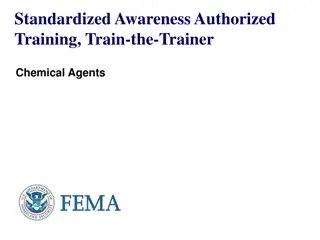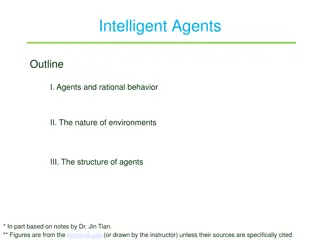Types of Agents in Business Law
Classification of agents into general, special, mercantile, and non-mercantile agents. Overview of general, special, and mercantile agents with their roles and examples. Understanding the scope and extent of an agent's authority, including real and apparent authority, in various business scenarios.
Download Presentation

Please find below an Image/Link to download the presentation.
The content on the website is provided AS IS for your information and personal use only. It may not be sold, licensed, or shared on other websites without obtaining consent from the author.If you encounter any issues during the download, it is possible that the publisher has removed the file from their server.
You are allowed to download the files provided on this website for personal or commercial use, subject to the condition that they are used lawfully. All files are the property of their respective owners.
The content on the website is provided AS IS for your information and personal use only. It may not be sold, licensed, or shared on other websites without obtaining consent from the author.
E N D
Presentation Transcript
HAJEE KARUTHA ROWTHER HOWDIA COLLEGE (Autonomous) PG AND RESEARCH DEPARTMENT OF COMMERCE E RESOURCES TOPIC: TYPES OF AGENT SUBJECT: BUSINESS LAW 1 (17UCRC34) K.RASOOL MYDEEN, ASSISTANT PROFESSOR
Classification of Agents An agent may be (1) General and (2) Special (or) (3) Mercantile and (4) Non-Mercantil
(1) GENERAL AGENT An agent who has authority to do all transactions relating to a particular trade or business. Example: Manager of a firm is called as General Agent
(2) SPECIAL AGENT An agent who is appointed to do a special act is known as Special Agent. Example: An agent appointed to sell a house. He has only a limited authority.
(3) MERCANTILE AGENT The following are the important Mercantile Agents: (i) Auctioneer: He is an agent appointed by the seller to sell goods by public auction for a commission. He is entrusted with the possession of goods and has authority to deliver them on payment of price. (ii) Factor: He is a mercantile agent entrusted with the possession of goods. He has the authority to sell or buy goods or raise money on the security of goods. He can also exercise general lien on the goods in respect of his claims arising out of the agency. (iii) Broker: He is a mercantile agent employed to make contracts with other parties for the sale and purchase of goods and securities for a commission called Brokerage'. He is not given the possession of goods and therefore, he has no lien over them.
Del Credere Agent: He is an agent, for an extra remuneration, guarantees to his principal against losses arising from the failure of a person with whom he contracts on behalf of the principal. Banker: He is an agent of his customers when he buys or sells securities, collects cheques, bills etc., for them. [vi Commission Agent: He is an agent employed to buy or sell goods or transact business for a remuneration called commission.
Scope and Extent of Agent's Authority The scope of authority of an agent depends upon the terms of his appointment or it may be implied by the circumstances of the case. The contractual authority is known as real or actual authority and the implied authority is known as apparent or ostensible authority. Thus, an agent having an authority to do an act has authority do everything lawful which is necessary for the purpose or usually done in the course of conducting business [Section 180) Agent's Authority Under Emergency In an emergency, an agent has authority to do all such things which may be necessary to protect his principal from loss, as would be done by a person of ordinary prudence, in his own case, under similar circumstances. Example: an agent sold oil at the best price available since the oil was useless due to delay in transit without principal's consent. The sales was held binding upon the principal. In any case, the agent should not act beyond his authority. If he so acts, the act will not bind the principal.
Delegation of Agent's Authority The rule is that an agent can not delegate his authority as he is enjoying the confidence of his principal. This is expressed by the maxim "delegatus non potest delegare" -a delegate cannot further delegate. But to this rule, the following are the exceptions: (i) Where the trade custom permits delegation. (ii) Where the nature of agency requires delegation. (iii) Where the principal permits such delegation. (iv) Where the duties of the agent do not require skill or confidence.
Sub-Agent and Substituted Agent A sub-agent is a person employed by, and acting under the control of the original agent in the business of agency (Section 191). Thus, there is no contractual relationship between him and the principal. He is responsible only to the agent. Section 194 provides that where an agent, having authority to name another person to act for the principal, has named another person accordingly, such person is not a sub- agent but an agent of the principal or substituted agent. His acts will bind the principal since there is privity of contract between him and the principal.
SUB-AGENT SUBSTITUTED AGENT (1) He is appointed.by the agent. He is named by the agent at the request of principal . But appointed by the principal. (2) He is an agent of original agent He is an agent of principal. (3) His acts will bind the original agent. (4) There is a contractual relationship between him and the original agent. His acts will bind the principal. There is no such relationship. (5) There is no contractual relationship between him and the principal. There is contractual relationship between him and the principal (6) He is under the control of orginal agent . He is under the control of principle
Duties of an Agent 1. ACTING WITHIN THE SCOPE OF AUTHORITY He must act within the scope of authority given to him and carry out the instructions of the principal. 2 ACTING WITH SKILL He must do the work with reasonable skill and delligence. 3 KEEPING ACCOUNTS He must keep proper accounts and produce them to the principal on demand. 4 DISCLOSURE OF KNOWN FACTS He must disclose to the principal all material facts known to him.























